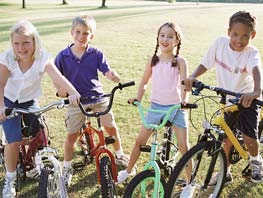

Fun Ways to Get Fit
Make snacking more fun by creating your
own popsicles or blending all your favorite
fruits into a smoothie. Then go get some
exercise by playing a game of kickball with
your friends.

Dr. George Traitses says eating healthy and exercising
doesn’t have to be boring!
You can spice up nourishing snacks and get exercise
without even realizing it with the following tips.
Eating Right
Let’s work our way up the food pyramid starting with
grains. You should be eating about 6 oz. of grains
every day—try to make at least half of them whole
grains. This isn’t as bland as you may think. For
breakfast, try whole-grain cereals like Cheerios or
Raisin Bran or oatmeal. For snacks, munch on low-fat
popcorn, and ask your mom to substitute brown rice
for white rice at the dinner table. And remember, just
because bread is brown doesn’t mean it’s whole grain.
Take a look at the packaging to make sure it says
“whole wheat” or “whole grain”—and check the label
on the back to be sure it has at least 2g of fiber.
You need 2.5 cups of vegetables a day. Have fun with
your veggies by choosing different colors for your
plate. Go green with broccoli or asparagus, and reach
for orange with carrots and sweet potatoes.
Every day you should eat at least 2 cups of fruit, but
this shouldn’t be hard. Fruits are just nature’s candy—
sweet and delicious. Try dried fruits for an easy snack,
or add berries to your cereal or oatmeal in the morning.
You can also add frozen fruit to smoothies for a
tasty treat in the summertime. Don’t get tricked by
juices: Read the label, and make sure they’re 100 percent
fruit! If water and sugar are main ingredients,
they are not!
Calcium builds strong bones. Make sure to eat 3 cups
of calcium-rich foods, like milk, on a daily basis.
Check the labels to make sure your milk, yogurt or
cheese is low fat. You can grab a yogurt for a delicious
snack on the go and toss in some fresh fruit for an
added flavor—and nutrient—bonus!
Protein—which you need for building muscles—can
be found in lots of different foods from chicken, turkey
and fish to nuts, seeds and beans. Ask for your meat
baked, broiled or grilled, not fried, and spice up a
salad with chickpeas, sunflower seeds or almonds.
Peanut butter falls into the protein category, as well,
but be sure to eat only small servings as it’s also high
in fat.
Get your fat facts and your sugar smarts from the
nutrition labels of food and drink. Limit foods that are
high in fats and sugars.
Get Moving
Turn the TV off, and move more. Aim for at least 60
minutes of activity every day. Swim, run, walk the dog,
bike, rollerblade, climb trees, play outside with friends
—it all counts!
Fun Ways to Exercise
• Weight lifting. Ask your PE teacher or an adult
to teach you how to do it right, so you don’t
hurt yourself. Take turns with a friend to give
your muscles a break between repetitions.
• Playing a pickup game of soccer or baseball
with friends.
• Kayaking. Head down to a lake or a river and
paddle around.
• Jumping rope. Have a competition with friends
to see who can go the longest without stepping
on the rope.
• Dancing. Turn up the volume on your favorite
tunes, and invite your friends over for an
impromptu dance party. You can find a lot of
great music on www.YouTube.com .
• Rollerblading. Dust off your skates, grab your
friends and hit the sidewalk for a tour of the
town or bring your hockey stick and join in a
game of street hockey.
Don’t Forget Water
Drink plenty of water. Hydration is the key element to
being fit. Teenagers need at least eight 8-oz. glasses
a day. If you are not a teenager yet, you should drink
at least five. Don’t replace water with fruit juices,
sodas or high-sugar sports drinks because these
actually dehydrate your body.
Get Plenty of Sleep
Nobody wants to have an early bedtime, but catching
some extra z’s is good for your body. Young children
need as much as 10 to 11 hours of sleep each night,
and eight hours is ideal for older kids.
If you don’t get enough sleep and rest, you may
have a harder time learning at school and reach for
food more, to get additional energy. Turning off the
TV and computer well before bedtime will help you
get to sleep much quicker. Instead, read a book or
talk to your parents or siblings about your day.
For more information on health and safety visit the Ontario Chiropractic Association
Web site at www.chiropractic.on.ca or call 1877-327-2273.
Dr. George Traitses, 416-499-5656, www.infinite-health.com
Make Fun Snacks and Share Them with
Friends
Ants on a log:
Spread peanut butter on a celery stick and decorate
with raisins.
Fruit smoothies:
Blend low-fat yogurt, orange juice and your
favorite fruits together for a refreshing snack.
Trail mix:
Make your own trail mix by combining your
favorite nuts, seeds and dried fruits.
Take a dip:
Dip veggies in low-fat ranch dip or hummus, and
try dipping fruits such as apples in peanut butter.
Homemade popsicles:
Fill an ice cube tray with lemonade or another fruit
juice and place popsicle sticks in each compartment
to make your own frozen treats.
Mini pizzas:
Smear some tomato sauce on half of a whole
grain English muffin, sprinkle on some low-fat
cheese, add chopped vegetables and a little bit of
lean meat and pop it in the microwave or toaster
oven for a minute.
Dr. George I. Traitses
D.C., B.Sc.(Hon.), M.Sc., C.H.N., C.N.M., A.C.R.B. 3, C.R.A.